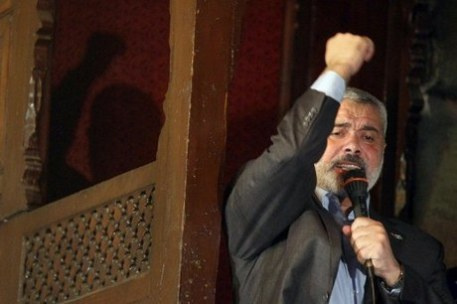Time to Tilt

(Photo: former Prime Minister Ismail Haniyeh praising the Syrians’ fight in Friday prayers in al-Azhar Mosque, Cairo)
After one year of relative silence, Hamas leaders have finally opted for explication: Ismail Haniyah backed the Syrian opposition during his speech in the Friday prayers of Cairo. Iranian Diplomacy probes Hamas’ turn in an interview with former deputy foreign minister and ambassador to Syria, Hossein Sheikhol-Eslam:
IRD: Are we seeing a genuine turn in Hamas’ position towards the protests in Syria?
HSE: Speaking of Hamas’s stance vis-à-vis the crisis in Syria, we have two points to consider: first, Hamas is an offshoot of the Muslim Brotherhood, and second, it developed in Syria. It was Hafez Assad who pursued resistance when the Egyptian President Anwar Sadat and King Hussein of Jordan signed peace deals with Israel, and it was his persistence that helped the development of Hamas. I think there is an internal conflict in the organization: one side appreciates Syria’s endorsement of Hamas throughout all these years and the price Damascus has paid for that, while the other group highlights Hamas’ historical roots, and the pressure it receives from its fellow Islamist brothers in Turkey, Syria and Tunisia. So it’s a time to tilt to one side.
IRD: Do you think Hamas has made a mistake by supporting the Syrian opposition?
HSE: Absolutely. Look how all the pro-Israel parties have gathered to support the Syrian opposition in Tunisia, where Riyadh is striving to convince other countries to arm the Syrian opposition, instigate a civil war, and pave the way for foreign intervention. Hamas should not have taken that path. This puts it beside Riyadh, Hillary Clinton and the Arab League leaders in the same picture. Hamas should stand by pro-Resistance countries.
IRD: Analysts are speaking of Hamas turning into a political party and putting its arms down after its national unity pact with Fatah in Doha. Is this a realistic analysis in your idea?
HSE: Ayatollah Khamenei’s comments in his visit with Ismail Haniyeh are the best answer to these speculations. He reminded Haniyeh of Arafat’s fate after he compromised with Israel, and of course added that he is sure Hamas would not move in that direction. Haniyeh also reaffirmed that he and his comrades will fight for a Palestine from the River [Jordan] to the [Mediterranean] Sea.
Of course Hamas is apparently getting more political. Mahmoud Abbas’ influence has been on the decline and he has failed to draw even the minimum concessions from Israel, even as insignificant as halting construction of Jewish settlements. So he has made what is merely a cosmetic anti-Israel gesture and that is calling for international official recognition of the Palestinian state in the United Nations. That can not change anything, I believe.
Abbas had to pose as the legal ruler of both the Gaza Strip and the West Bank to advance the statehood motion in the UN. Hamas was shrewdly aware of his situation and that is why it welcomed national unity. Hamas believed that it could reaffirm its popularity among the Palestinians in the second parliamentary election, especially with the Islamic Awakening movement gaining momentum across the region. This way, it could choose its own prime minister for both parts of the Palestinian territories after it secured the majority in the parliament. Khaled Mash’al signed the Doha treaty with Mahmoud Abbas based on this assumption, although the progressive wing of Hamas is against the deal. Also, legally speaking, the Palestinian constitution also bans simultaneous service in the premiership and presidency portfolios.
Anyway, if Hamas abandons armed resistance, it will be no different from other Palestinian groups. Hamas gained all its power and popularity from armed resistance and undermining the security of Israel. That is why the Supreme Leader recounted the saga of Yasser Arafat for Ismail Haniyeh. Arafat also thought that political games instead of armed resistance could turn their dreams of a Palestinian state true, but we saw how they lost mettle step-by-step and received the short end of the stick.
IRD: Hamas’ stance and the Syrian crisis seem to have weakened links of the Resistance chain in the Middle East. How could these developments affect Iran?

